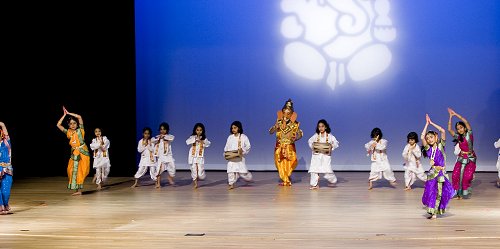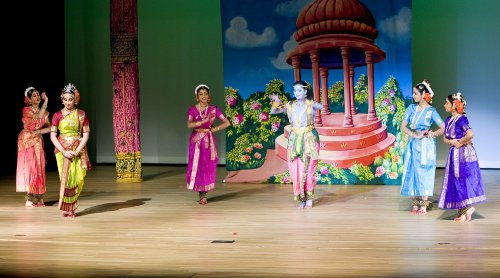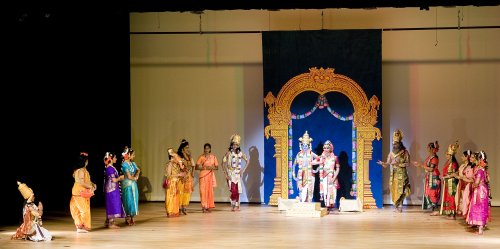 |
 |
Natyanjali
presents Kalyana Srinivasam
Natyanjali Kuchipudi Dance School of Plano, TX presented Kuchipudi dance drama KALYANA SRINIVASAM under the direction of Srilatha Suri, a senior student of Dr. Sobha Naidu. The dance drama, depicting the story of the celestial wedding of Lord Srinivasa of Tirupati and Goddess Padmavati, was choreographed by Sobha Naidu herself and was a veritable feast to the eyes of an enthusiastic audience of about six hundred who packed the Patty Granville Arts Center, Garland, TX to enjoy the show on Saturday, March 8, 2008. The story of Kalyana Srinivasam, which is very popular in Andhra folklore, starts with the Saptarishis performing a yagnam. When asked by Narada about who among the Trinity - Brahma, Vishnu and Shiva, should be the recipient of the fruits of the yagnam, they select sage Bhrigu to make the decision. Bhrigu visits the abodes of Brahma, Shiva and Vishnu, who are all in a state of conjugal bliss with their spouses Saraswati, Parvati and Lakshmi. Enraged at what he perceives as lack of respect for him, the sage curses Brahma and Shiva. In Vaikunta, however, he kicks Vishnu on the chest, who cleverly subdues the ego of the sage but forgives him. Lakshmi, unable to tolerate the sage’s insult, leaves Vaikunta. The sequence of events that follow lead to the establishment of Vishnu and Lakshmi as Lord Srinivasa and Goddess Padmavati on earth in Tirupati, which is called Bhooloka Vaikunta.  Kuchipudi veteran
guru Vedantam Raghava donned the role of Bhrigu (and later the roles
of Chola Raja and Akasha Raja) with characteristic aplomb. Dhanya Yelamanchi
and Srirupa Banda as Brahma and Saraswati impressed, as did Himabindu Challa
and Vaidehi Yellai as Shiva and Parvati. Himabindu’s footwork and precise
body movements in particular were outstanding. The opening visuals in the
Kailasa and Vaikunta scenes, the former with Shiva and Parvati about to
commence Tandavanrutya, and the latter with Vishnu and Lakshmi seated on
Adisesha, floating on the ocean of milk, had an ethereal, out of the world
quality about them. Of particular note in the Vaikunta scene was the part
where Vishnu and Lakshmi (played by Pallavi Kumar and Srilatha Suri) are
engaged in a game of dice (Leelamaya Jagannaatakame in Bhimpalas). Srilatha’s
forte, abhinaya and natya, were in full display in ‘Entulundu Vaikuntamandu’
(in Sindubhairavi), meaning “How shall I stay on in Vaikunta” where Lakshmi,
upset with Bhrigu’s actions and Vishnu’s lack of anger at them, decides
to leave Vaikunta. Forlorn and lost without Lakshmi, Vishnu takes Narada’s
advice and decides to descend to earth.
Lakshmi later transforms herself into a ‘gollabhama’ (cowherdess) and seeks to find her Lord with the help of Shiva and Brahma, who are now in the forms of a cow and calf. She approaches Chola Raja, who buys the cows and instructs his cowherd to take them to the royal cowshed. When the cowherd discovers that the cow is not yielding milk, he follows it and finds it emptying its udder over an anthill. Not realizing that the cow is nourishing the Lord himself, the cowherd hurls his stick at the cow. Vishnu steps out of the anthill to protect the cow and takes the blow on His forehead. The king kills the cowherd for hurting Vishnu, and Vishnu in turn curses the king for his harsh behavior. Vedantam Raghava as the Chola king was majestic. Mouna Yalamanchi as the sprightly gollabhama was charming in the sequence (Idi ento sadhuvaina), and young Sricharan Navuluri as the cowherd was pleasing, particularly in the sequence where the cowherd is upset with the cow (Aavu nee tassadeeya). The ‘dancing cows’ (Mouctika Paluri, Neha Bode, Mallika Gandhi and Shrutika Reddy) left younger members of the audience amused. The emergence of Vishnu from the anthill marks the beginning of the second half of the story. Wandering among the hills of the Chola kingdom, Vishnu visits the ashram of Vakuka Devi, who is deeply immersed in her worship of Krishna (Janmaantaramula gnyaapakamulu raa in Neelambari). Vishnu reminds her that in her previous life even though she was Yashoda, Krishna’s foster mother, she had not been fortunate to witness any of His weddings. He promises her that as Vakula, she will witness His wedding, as Srinivasa, to Lakshmi. Mouna Yalamanchi gave a convincing portrayal as Vakula, while little Suman Vadlamani played the young Krishna playing around in Vakula’s imagination.  Disheartened by the sakhis’ behavior, Srinivasa goes back to Vakula’s ashram, where Narada advises him to become an ‘erukalasaani’ (soothsayer) and facilitate His own wedding with Padmavati. The ‘erukalasani’ visits Akasa Raja’s palace, where she convinces Padmavati’s parents, Akasa Raja (Vedantam Raghava) and Dharani Devi (Vaidehi Yellai) that Padmavati is destined to marry Srinivasa, who is none other Vishnu Himself come down to earth. The erukalasani’s visit is followed immediately by Vakula’s visit to the royal couple with a proposal from Srinivasa to wed Padmavati, and of course, they agree. Jyothi Chintalapudi excelled in the brief but important role of the erukalasani. The celebrations that follow the news of the impending wedding was depicted with a lively ‘suvvi’ dance (Pranhuti Suri, Bhaskari Burra, Bharathy Sunkara, Spruha Deval, Srirupa Banda and Rima Niyogi) which showed womenfolk engaged in wedding preparations such as pounding rice and turmeric and decorating the city. With a folksy touch and fast paced movements, this item was popular with the audience.  |